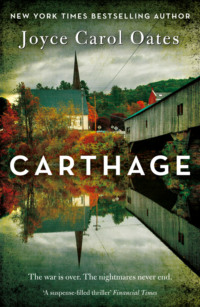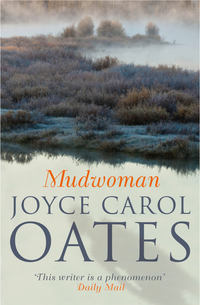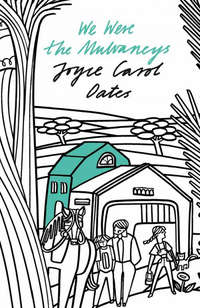
Полная версия
The Sacrifice
Ada was uneasy remembering Ednetta Frye from the previous morning. She’d seen the distraught woman first crossing Camden Avenue scarcely aware of traffic, then in the Korean grocery, then approaching people in Hicks Square who stared at her as you’d stare at a crazy person. Ednetta had seemed so distracted and disoriented and frightened, nothing like her usual self you could talk and laugh with—it was Ednetta who did most of the talking and the laughing at such times. There’d been occasions when Ednetta had a bruised face and a swollen lip but she’d laugh saying she’d walked into some damn door. You guessed it had to be Anis Schutt shoving the woman around but it wasn’t anything extreme, the way Ednetta laughed about it.
Ada was at least ten years younger than Ednetta Frye. She’d substitute-taught at the middle school when Ednetta’s daughter Sybilla had been a student there, a year or two ago; she knew the Fryes from the neighborhood, though not well.
They were neighbors, you could say. East Ventor crossed Crater and if you took the alley back of Crater to Third Street, somewhere right around there Ednetta was living in one of the row houses with that man and her children—how many children, Ada had no idea.
With her education degree and New Jersey teacher’s certificate Ada Furst liked to think that there was something like a pane of glass between herself and people like the Fryes—it might be transparent, but it was substantial.
But the day before, Ednetta hadn’t been in a laughing or careless mood. She’d been anxious and frightened. She’d showed Ada photos of Sybilla as if Ada didn’t know what Sybilla looked like—Ada had had to protest, “Ednetta, I know what Sybilla looks like! Why’re you showing me these?”
Ednetta hadn’t known how to answer this. Stared at Ada with blank slow-blinking eyes as if she hadn’t recognized Ada Furst the schoolteacher.
“She’s probably with some friends, Ednetta. You know how girls are at that age, they just don’t think.”
Ednetta said, “S’b’lla know better. She been brought up better. If Anis get disgusted with her, he goin to discipline her—serious. S’b’lla know that.”
Ada said another time that Sybilla was probably with some friends. Ednetta shouldn’t be worried, just yet.
“I don’t know how long you’d be wantin me to wait, to be ‘worried,’” Ednetta said sharply. “I told you, Anis don’t allow disrespectful behavior in our house. S’b’lla got to know that.”
Clutching her photographs Ednetta moved on. Ada watched the woman pityingly as she approached people on the street, imploring them, practically begging them, showing the pictures of Sybilla. Most people acted polite, and some were genuinely sympathetic. There was something not right about what Ednetta was doing, Ada thought. But she had no idea what it was.
Ada was ashamed now, she’d spoken so inanely to Ednetta Frye. But what did you say? Girls like Sybilla were always “running away”—Ada knew from being a schoolteacher—meaning they were staying with some man likely to be a dozen years older than they were, and giving them drugs. What she could remember of Sybilla Frye from the middle school, the girl was sassy and impudent, restless, couldn’t sit still to concentrate, had a dirty mouth to her, and hung out with the wrong kind of girls. Her grades were poor, she’d be caught with her friends smoking out the back door of the school—in seventh grade. None of that could Ada tell poor Ednetta!
Ada knocked at the second-floor door of a woman named Klariss—just a thought, she’d ask Klariss to come with her. But Klariss was as vehement as Ada’s mother. “You keep outa that, Ada. You know it’s some drug dealer somebody put a bullet in, or some druggie OD’ing. You get mixed up in it, the cops is gonna mix you up with them and take you all in.”
Weakly Ada tried to cajole Klariss into at least coming outside with her, in back of the building—“You don’t have to come any farther, K’riss. Just, like—see if anything happens …”
But Klariss was shutting her door.
In the front vestibule were several tall teenaged boys on their way outside—ebony-black skin, mirthful glances exchanged that signaled their awareness of / disdain for stiff-backed Ada Furst they knew to be some kind of schoolteacher—(these were boys born in Red Rock of parents from the Dominican Republic who lived upstairs from Ada)—and for a weak moment Ada considered asking them to accompany her … But no, these rude boys would only laugh at her. Or something worse.
Outside, Ada walked to the rear of the building. No one ever went here, or rarely: behind the tenement was a no-man’s-land of rubble-littered weeds and stunted trees, sloping to a ten-foot wire fence at the riverbank, against which years of litter had been blown and flattened so that it resembled now some sort of plaster art installation. In this lot tenants had dumped trash that included refrigerators, mattresses, chairs and sofas and even badly broken and discolored toilets. (Ada recognized a broken lamp that had once belonged to Kahola, her sister must’ve tossed out here. For shame!)
Ma and Karliss were right: Ada shouldn’t be here. Hadn’t there been a murder in this block, only a week ago, one in a series of young black boys shot multiple times in the back of the head, dragged into an abandoned house to bleed out and die …
But this person, if it was a person, was alive. Needing help.
Noise from jetliners in their maddening ascent from Newark Airport a few miles away, that began in the early morning and continued for hours even on weekends. Ada couldn’t hear the crying sound, with those damn jets!
Ada checked to see: was anyone following her? (The tall black-skinned Dominican boys, who hadn’t said a word to her though she’d smiled at them?) She made her way through the debris-strewn lot to the fence, that overlooked the river. Here she felt overwhelmed by the white, vertically falling autumn sunshine, that blinded her eyes. And the wide Passaic River with its lead-colored swift-running current that looked to her like strange sinewy transparent flesh, a living creature with a hide that rippled and shivered in the sunshine. Oil slicks, shimmering rainbows. The Passaic had once been a beautiful river—Ada knew, from schoolbooks—but since the mid-1800s it had been defiled by factories and mills dumping waste, all sorts of debris, tannery by-products, oil, dioxin, PCBs, mercury, DDT, pesticides, heavy metals. Upriver at Passaic was Occidental Chemical, manufacturers of the most virulent man-made poison with the quaint name—Agent Orange. Supposedly now in the late 1980s in these more enlightened times manufacturers had been made to comply with federal and state environmental laws; cleanups of the river had begun but slowly, at massive cost.
When she did move away from East Ventor, Ada thought, she would miss the river! That was all that she would miss, even if it was a poisoned river.
It had long been forbidden to swim in the Passaic—(still, boys did, including Ada’s twelve-year-old nephew Brandon: you saw them on humid summer days swimming off rotting docks)—and most of the fish were dead (if any survived you’d be crazy to eat them but every day, every morning at this time in fact, there were people fishing in the Passaic, mostly older black men with a few women scattered among them).
Ada’s grandfather Franklin had been one of the fishermen down by the docks, in the last years of his life. He’d been happy then, Ada had wanted to think. Bringing back shiny little black bass for her grandmother to clean, gut, sprinkle with bread crumbs and fry in lard. How much poison they’d all eaten, those years, not knowing any better or indifferent to knowing, Ada didn’t want to speculate.
This morning the river was bright and choppy. There were a few boats, at a distance. On the farther shore were shut-down factories and mills that hadn’t been operating since she’d been in high school. Vaguely she could remember her father and grandfather working at Pascayne Welding & Machine when she’d been a little girl in the 1960s, then later her father worked at Rand Alkali Pesticides until his health deteriorated and he’d been laid off. (The pesticide factory sprawling among seven acres of “hazardous” land within the Pascayne city limits had been shut down by the New Jersey Board of Health in 1977 for its toxic fumes and carcinogenic materials. There’d been a settlement between Rand Alkali and the State of New Jersey but whatever fines had been paid had made little difference to the sick employees like Ada’s father whose disability pension was less than his Social Security, and the two checks together came to less than he required to live with any dignity in even the shabby tenement at 1192 East Ventor.)
Ada listened: there came the crying again. Now, it sounded like a plaintive mewing, that had all but given up hope.
Definitely, the sound was coming from the old Jersey Foods factory next-door.
The fish-canning factory was a ruin that would one day slide into the river, next time it flooded. Last time, the spring of 1985, filthy river-water had risen into the factories on the riverbanks as into the dank dirty cellars of residences like Ada’s. A powerful stink had prevailed for weeks. The state had declared a disaster area for some and a makeshift shelter had been established in the high school gymnasium and the Pascayne Armory. Fortunately, Ada and her family hadn’t had to be evacuated. Kahola had been living with them then.
Approaching the factory with its broken, boarded-over windows Ada tried not to think This is a mistake. I am making a mistake.
There was no man in her life, as there’d been in her sister’s life. Not a single man in Kahola’s life but numerous men. Ada was too free to make decisions of her own, too reckless. It was the price of her female independence and a certain stiffness, resentment even, about inhabiting a fleshy female body. Oh, she was frightened now. But damn if she’d turn back. She cupped her hands to her mouth and called: “Hello? Is anybody there?”
The cries seemed to be coming from the factory cellar. Bad enough to be inside the nasty fish-factory, but—in the cellar! There were steps leading down, a door that had been forced open years ago. Everywhere was filth, storm debris and mud. Ada drew a deep breath and held it.
She thought—It’s only a cat. A trapped starving cat.
A wounded cat.
Planning how she would trap the cat—in a box?—somehow—and take it to an animal shelter.
(But how practical was that? The shelter would euthanize the cat. Better to keep the cat.)
(But she couldn’t keep the cat! No room for a scrawny diseased alley cat in their place already too small and cramped for the people who lived there.)
It was 8:20 A.M. It was a bright cool Sunday morning in October. Ada Furst would recall how she made her way into the cellar down a flight of steps littered with broken glass and pieces of concrete as she continued to call in a quavering voice—“Hello? Hello?” A pale, porous light penetrated the gloom, barely.
The cry came louder. Desperate.
Ada blinked into the shadows. Ada took cautious steps. She could hear someone whispering Help me help me help me.
Then she saw: the girl.
The girl was lying on the filthy floor in the cellar not far from the entrance, on her side facing Ada, on a strip of tarpaulin, as if she’d been dragged partway beneath a machine. She appeared to be tied, wrists and ankles, behind her back. It looked as if there’d been a wadded rag in her mouth, she’d managed to spit out. And around the girl’s head was a cloth or a rag she’d worked partway off. Her hair was matted with mud and something very smelly—feces? Ada began to gag. Ada began to scream.
“Oh God. Oh God! My God.”
A girl of thirteen, or fourteen. On the filthy floor, she looked like a child.
Ada was stricken with horror believing that the girl was dying: she would be a witness to the girl’s death. She’d wasted so much time—she’d come too late—the girl was shivering uncontrollably, as if convulsing. Ada crouched over her, hardly daring to touch her. Where were her injuries? Was she having a seizure? Ada had a confused sense of blood—a good deal of blood—on the tarpaulin, and on the floor. It seemed to her that the girl had been mutilated somehow. The girl’s bones had been broken, her spine deformed. Ada would swear to this. She would swear she’d seen this. Certainly the girl’s face was swollen, her eyes blackened and bruised. Dark blood had coagulated at her nose, that looked as if it had been broken. How young the girl seemed, hardly more than a child! Her clothing was torn and bloody. Her small breasts were bared, covered in a sort of filthy scribbling. Cruelly her legs were drawn up behind her back, hog-tied.
Ada was telling the girl she was here, now. She would take care of her, now. The girl would be all right.
“Is it—Sybilla? Sybilla Frye?”
Feebly the girl tried to free herself, moaning. Ada pulled at the ropes binding her wrists and her ankles, which were thin ropes, like clothesline—tugged at them until a knot came loose and she could lift the girl in her arms, into a partially sitting position on the filthy tarpaulin. The stench of dog shit was overwhelming. The girl was shivering in terror. Saying what sounded like They say they gon come back an kill me—don let em kill me! When Ada tried to lift her farther, out of the filth on the tarpulin, the girl began to squirm and fight her, panting. She seemed not to know who Ada was. Her eyes rolled back in her head. She fell back heavily, as if lifeless. Ada would not wonder at how readily the knotted rope had come loose, at this time. Ada was begging the girl: “Don’t die! Oh—don’t die!”
Yes I saw she was Sybilla Frye. I saw that right away.
Ada Furst ran stumbling and screaming for help.
A first-floor resident in her building called 911.
An ambulance from St. Anne’s Hospital, two miles away on the other side of the river, arrived in sixteen minutes.
The first query on the street would be—She goin to live?
Then—Who done this to that girl?
“White Cop”
OCTOBER 7, 1987
Jesus help me
Say they gon kill me, I tell anybody Dear Jesus help me, they hurt me so bad and they will do worse they say next time my mama they gon hurt bad an my lit sister an any nigra they find where I live, they told me they will murder us all
They was hopin I would die, they leave me in this place to die sayin you be eaten by beetles nasty black cunt you deserve to die you are SO UGLY
Thought I heard say there was other dead nigras in this place they was laughin about where they drag me thinkin I would not live this like cellar-place they say, you will die here an beetles eat you only just bones left nobody gon recognize by the time those beetles finish with you
They had white faces an one of them a badge like a cop would wear or a state trooper an they had guns an one of them, he put that gun barrel up inside me and it hurt so bad I was crying so bad they said Nigra cunt you stop that bawlin, we gon pull this trigger an all yo’ insides gon come splashin out your ugly nappy head
And they laugh, laugh some more
All the time they be laughin like they are high on somethin smokin crack, I could smell
The Pis’cyne cops they con-fis-cu-ate the crack an smoke it for themselves, why they are crazy to kill black people they white bosses tell them, you give us our percent of the money we be OK how you behave
Grabbed me from behind where I was walkin from school in the alley behind the car wash on Camden some kind of canvas they pulled down over my head like a hood and I was screamin but couldn’t get free to breathe Thought I would die an was cryin Mama! Mama! till they stuffed a rag in my mouth near to choking me O Jesus
It was in the back of a van it was a police van, I think there was a siren they were laughin to use a cop can use a siren any time he wishes they drove to underneath the bridge I could hear the echo up under the bridge I could recognize that sound like when we were little and played there, and put our hands to our mouths and called up under the bridge and it was like pigeons cooing and the echo coming back and the water lapping except now, I could not hear any echo the white men were laughin at me took turns kicking and beating and strangling me raped me like with they guns and fingers sayin they would not put their pricks in a dirty nasty disease nigra cunt they jerked themselves off onto my face that’s what they done they said, swallow that, you ignorant nigra bitch how many times how many of them they was who hurt me, I could not see I thought five, maybe five—their faces were white faces—there was a badge this one was wearin, shiny spit-in-your-face badge like a cop wear or a state trooper an they laughin at me sayin nobody will believe a dirty nigra cunt taking her word against the word of decent white men
The van, they drove somewhere else then here was maybe other men came into it it was a night and a day and a night I was hurt so bad, my eyes was puffed shut I was fainted from the bad hurt and bleedin up inside me it was all sore and bleedin and my mouth, and my throat they’d stuck the gun barrel down into my throat too there was more than one of them did it they said, this is what you like black nigra cunt aint it
Tied me so tight like you’d tie a hog no water and no food, they was hopin I would weaken and die some of them went away, an other ones came in their place Nigra hoar of babyland they was laughin
I could not see their faces mostly I heard their voices
There was one of them, a young one he was sayin why dint they let him blow out the nigra cunt’s brains he would do it, he said
In my hair and on my body they smeared dog shit to shame me when they was don with me two of them dragged me from the van to that place in the cellar they put they foot on the back of my head to press into the earth they would leave me there, they said beetles would eat me and nobody give a damn about some ugly nappy lit nigra girl if she live or die and nobody believe her, that a joke to think!
O Jesus help me I am afraid to die, Jesus help me I have been a bad girl is this how I am punished, Jesus an Jesus say, the last shall be first an the first shall be last an a litl child shall lead them AMEN
St. Anne’s Emergency
OCTOBER 7, 1987
She’d been left to die.
She’d been beaten, and raped, and left to die.
She’d been hog-tied, beaten and raped and left to die.
Just a girl, a young black girl. Dragged into the cellar of the old fish-factory and if she hadn’t worked the gag out of her mouth, to call for help, she’d have died there in all that filth.
It was that 911 call. That call you’d been waiting for.
You’d expect it to be late Saturday night. Or Friday night. Could be Thursday night. You would not expect the call to be Sunday morning.
And that neighborhood by the river, East Ventor and Depp. Those blocks east of Camden Avenue. High-crime area the newspapers call it. After the fires and looting of August 1967 spilling over from the massive riot in Newark, the neighborhood hadn’t ever recovered, Camden Avenue west for five or six miles looking like a war zone twenty years later, shuttered storefronts, dilapidated and abandoned houses, burnt-out shells of houses, littered vacant lots and crudely hand-lettered signs for rent for sale that looked as if they’d been there for years.
Many times, the calls come too late. The gunfire-victim is dead, bled out in the street. The baby has suffocated, or has been burnt to death in a spillage of boiling water off a stove. Or the baby’s brains have been shaken past repair. Or there’s been a “gas accident.” Or a child has discovered a (loaded) firearm wanting to play with his younger sister. Or a man has returned to his home at the wrong time. Or a drug deal has gone wrong. (This is frequent.) Or a drug dose has gone wrong. (This is frequent.) Or a space heater has caught fire. Or a carelessly flung burning cigarette has caught fire. Or a woman has swallowed Drano and has lain down to die. Or a gang of boys has exchanged multiple shots with another gang of boys. Or a pit bull maddened by hunger has attacked, sunk its fangs into an ankle and will not release the crushed bones until shots from a police service revolver are fired into its brain.
Calls of desperation, dread. But exhilaration in being so summoned, in a speeding ambulance, siren piercing the air like a glittering scimitar.
You are propelled by this speed. You are addicted to the thrill of danger, this not-knowing into which you plunge like a swimmer diving into a swirling river to “rescue” whoever he can.
But now there is this call—to change your life in a way you will regret.
Damn it wasn’t true the ambulance had taken its time getting there! Sixteen minutes but we’d been slowed down on the bridge and the 911 dispatcher had given us an incomplete address.
It being a black neighborhood, it would be claimed. The EMTs from St. Anne’s had taken their time.
We’d responded to the dispatcher as we always did.
We said, there was no difference between this emergency summons and any other—except what would be made of it, later.
When we arrived at the corner of East Ventor and Depp we hadn’t known immediately where to go. The dispatcher hadn’t been told clearly where the injured girl was.
Something about a factory. Factory cellar.
So we’d wasted minutes determining what this meant. We’d been told “cellar”—so we had flashlights in case flashlights were needed. Searching for a way through the chain-link fence until a woman appeared and screamed at us about a “dying girl”—a girl “bleeding to death”—and directed us where she was.
First thing we observed was that the girl (later identified as “Sybilla Frye”) lying on her side on the cellar floor on a strip of tarpaulin seemed to be conscious but would not respond to us, as if she was unconscious.
When we came running down into the cellar with flashlights we saw that the girl’s eyes were open but immediately then she shut them when the light came onto her face. We saw her lift her hands to hide her face from the bright light.
It was our concern that the girl was in severe physical distress, in shock, or bleeding internally, we had to determine immediately, or try to determine, before lifting her onto a stretcher.
Her face was bloodied and battered. There was a towel or a rag partly tied around her head and her hair was matted with filth.
There were no evident deep lacerations of the kind made with a sharp weapon or gunshot. Wounds were superficial, though bloody. There did not appear to be a severe or life-threatening loss of blood.
There was a strong smell of excrement—possibly human, or animal.
It looked like the girl had been tied with a clothesline but when we arrived, the clothesline had been untied. The woman who’d met us outside said she’d found the girl tied and had untied the girl. Her wrists and ankles had been tied behind her—“hog-tied.”
Well, we thought there was something strange—the injured girl had been communicating with the woman who’d found her, the woman told us—but then, she wouldn’t communicate with us.
She was limp and her arms were, like, falling loose—like a person would be if she was unconscious. But when we touched her she stiffened up. She’d shut her eyes tight and kept them shut.
That girl was in a state of shock! She didn’t know who we were.
We identified ourselves. She had to know we were a rescue team.
But she was scared! She was terrified. She was just a girl and somebody had almost killed her. She might’ve thought we were her assailants coming back. She was shivering—her skin felt clammy when I touched her.
She never did talk to us. Not a word.







